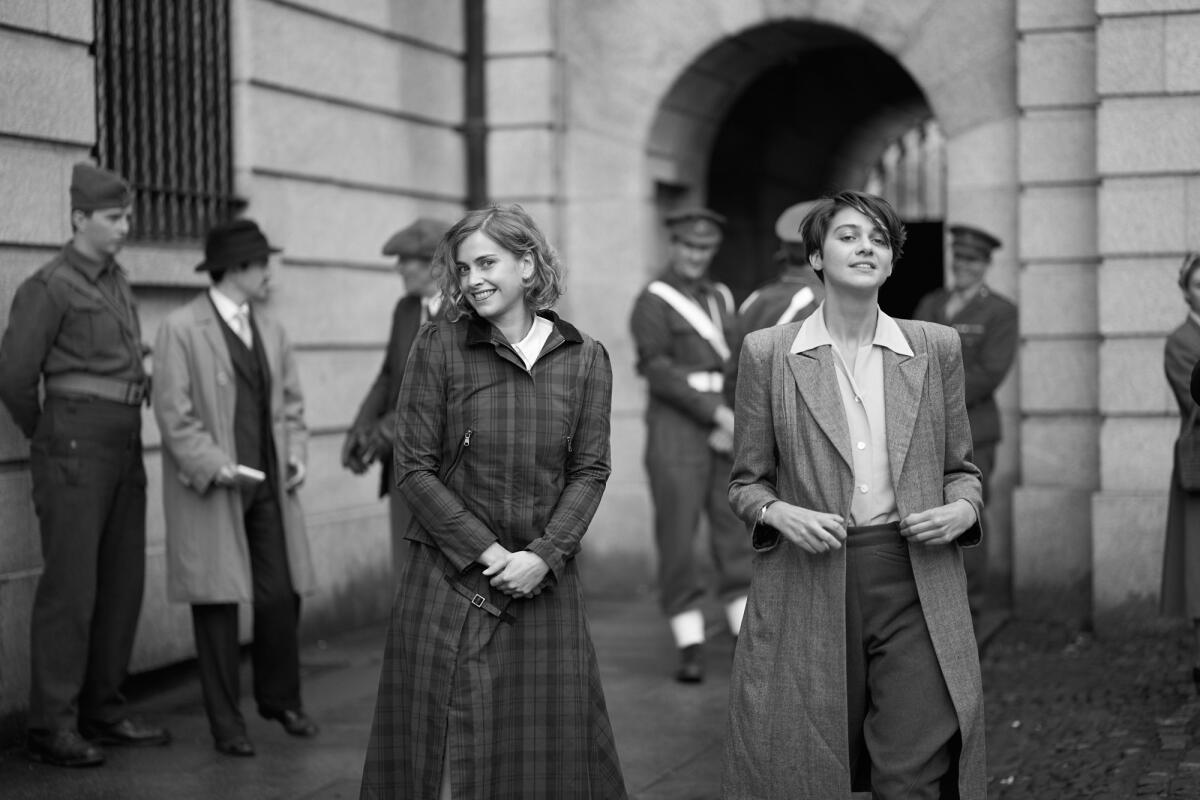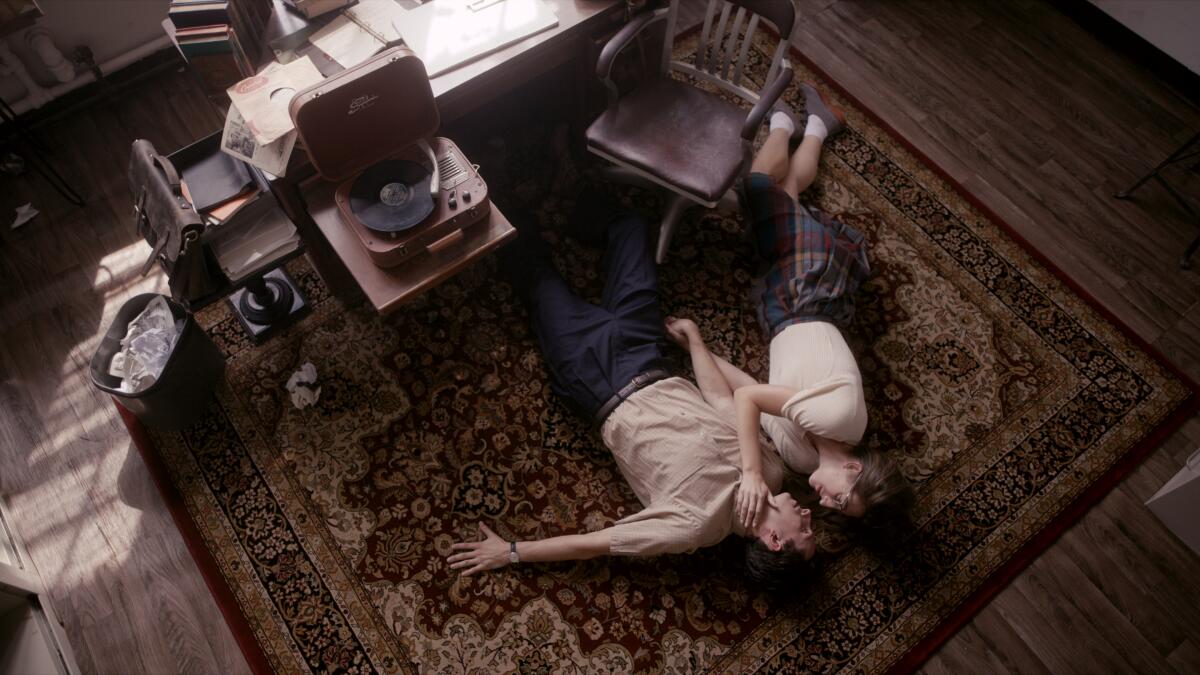Reviews: An alternate WWII sci-fi drama, a spy doc and the best movies to stream this week

The best movie to stream this week
The lo-fi sci-fi oddity “Lola” moves fast, so try to keep up with the premise: As World War II rages in Britain, two Sussex sisters, Martha (Stefani Martini) and Thomasina (Emma Appleton), pass the time with a strange invention, a specially tuned television that receives broadcasts from the future. To help with the war effort, they use the machine to feed intel to the military about what the Nazis are about to do. After that task is done each day, they pop open a bottle of wine and dance around their huge country house to the music of David Bowie and the Kinks. They also constantly shoot home movies, the footage of which — combined with clips from old newsreels — makes up “Lola,” the very film we’re watching. Got that?
Writer-director Andrew Legge and his co-writers, Angeli Macfarlane, Henrietta Ashworth and Jessica Ashworth, pack a lot of story into just under 80 minutes, and a lot of ideas into a film that was mostly shot in just a few locations, with a small cast. There are influences and forebears aplenty: the shoestring time-travel adventure “Primer,” the archival footage-heavy war movie “Overlord,” the DIY punk cinema of Derek Jarman (I could go on).
But while Legge and company don’t always have full control of this material, “Lola” never feels too gimmicky. The film goes on some fertile philosophical tangents, as Martha and Thomasina debate their responsibilities to the present and to the future — the latter of which changes in dramatic ways after the ladies start meddling in the war.
And even with all the metaphysical mayhem, the movie remains rooted in the lives and attitudes of its characters, and in the magnetic performances of Martini and Appleton. The sisters choose not to wait 20 or 30 years to live the kind of life promised by rock ’n’ roll and cool 1960s movies. Like the makers of the film, they’re inspired by pop culture’s potential.
“Lola.” Not rated. 1 hour, 19 minutes. Available on VOD
The genre film of the week
The Italian postapocalyptic drama “Darkness” (a.k.a. “Buio”) has a hypnotic, nightmarish quality — like a horror movie, but one where the existential threat has been around for so long that the heroes have become accustomed to it. Directed by Emanuela Rossi (who also co-wrote the screenplay with producer Claudio Corbucci), the film stars Denise Tantucci as Stella, a 17-year-old who entertains and nurtures her younger sisters in a dark and spooky old house while their father, named only as “Father” (Valerio Binasco), scavenges for food and supplies in a world apparently ravaged by environmental catastrophe. Stella also protects the girls from Father, who has an explosive temper, a penchant for mental cruelty and a way of embracing his kids that looks a lot like sexual assault.
“Darkness” mostly remains vague about the crisis that drove this family indoors. It’s clear something has gone awry in the outside world, though perhaps not quite in the way Father says. The movie is vague too about the extent of Father’s abuse. “Darkness” sticks close to Stella’s perspective and thoughts, which include actual memories and what may be imagined scenarios. Rossi is in no way noncommittal, though, about Stella’s mental and emotional state, which has been worn raw by years of managing the whims of an abusive creep.
Viewers are welcome to read this film as a metaphor for pandemic quarantine or for enduring an oppressive patriarchy. From moment to moment, though, “Darkness” is a harrowing and affecting story about young women trying to hold onto hope across the grim, unchanging days.
“Darkness.” In Italian, with subtitles. Not rated. 1 hour, 36 minutes. Available on Film Movement+
The documentary of the week

Steve James’ career as a documentarian has spanned movies about high school basketball (the classic “Hoop Dreams”), film critic Roger Ebert (“Life Itself”), a failed community bank (“Abacus: Small Enough to Jail”) and more. What unifies these films — along with James’ latest, “A Compassionate Spy” — is an understanding that no true story ever ends neatly. Life keeps sprawling, perspectives keep changing. Triumphs are recast as tragedies (and vice versa, depending on who’s on the losing side).
“A Compassionate Spy” is about Ted Hall, a brilliant physicist who was the youngest person — at age 18 — to work on the Manhattan Project. After the war, he went to grad school in Chicago, where he met Joan, whom he married and later made a confession: During his time at Los Alamos, he fed the Soviets classified information about the U.S. nuclear program. The Halls went on to live a good life together, and they remained staunch supporters of leftist causes. But as Russia slid into authoritarianism and expansionism after WWII, Ted’s choice seemed less righteous, even if it was born of a belief that it was dangerous for only one country to have the bomb.
This absorbing, thoughtful film doesn’t take sides; that’s not James’ way. Instead, via interviews, film clips and dramatic re-creations, “A Compassionate Spy” revisits the changing world the Halls passed through together: a place where America was once allied with the Russians and wary of superpowers. Ted and Joan were committed to their ideals and loyal to each other. If they’d been caught by the federal government, they could’ve been persecuted like the Rosenbergs. Instead, they became productive members of society. It was what it was.
“A Compassionate Spy.” Not rated. 1 hour, 41 minutes. Available on VOD
Blu-ray of the week
When Clive Barker’s “Nightbreed” hit theaters in 1990, the horror filmmaker’s fans were disappointed. After some studio meddling, Barker cut his adaptation of his own richly detailed novel “Cabal” — about a city where monsters live freely, away from fearful humanity — into a stripped-down action movie, heavier on violence than on the plot, character or scene-setting that made the book special. About a decade ago, Barker finally got the chance to re-edit “Nightbreed,” creating a version that’s 20 minutes longer, featuring alternate takes and scenes that emphasize the culture of this monster community as much as the villains out to destroy it. That director’s cut has been upgraded to 4K for a new four-disc collector’s edition, which includes the hours of commentary tracks, interviews and behind-the-scenes featurettes that made Scream! Factory’s previous set a must-buy for horror buffs.
“Nightbreed: Collector’s Edition.” Scream! Factory 4K Ultra HD and Blu-ray
More to Read
Only good movies
Get the Indie Focus newsletter, Mark Olsen's weekly guide to the world of cinema.
You may occasionally receive promotional content from the Los Angeles Times.










